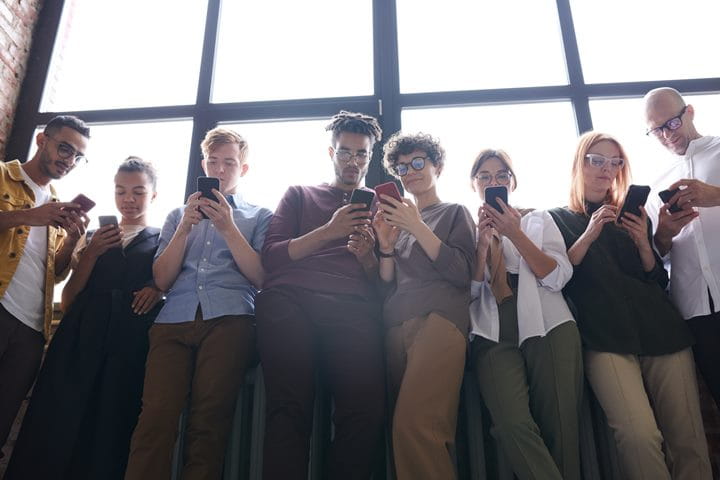Reducing social media screen time these holidays
Tips to help you reduce your social media usage and overall screen time that can help improve overall wellbeing.
The summer holidays, whether you celebrate Christmas or not, is a great occasion to spend some quality time with your loved ones.
But we all have at least one friend or family member that cannot go an entire meal without checking their phone. If you can’t think of anyone, then it might be you!
A staggering 79% of Australians are on social media, with 99% of 18-29 year olds using it, 96% of 30-39 year olds, 86% of 40-49 year olds and 66% of 50-64 year olds.

Quick stats:
- Overall, 15% of people have felt anxious when unable to access their social media accounts. This number is significantly higher among 18-29 year olds (37%).
- Almost 19% are happy to check social media while eating with family or friends. At 33%, 30-39-year-olds are the biggest culprits.
- 11% of people have worried their social media footprint might one day come back to bite them. 30-39-year-olds are the most likely to feel this way at 15%.
- 35% of people now access social media more than five times per day, up from 26% last year. 89% of 18-29-year-olds check-in at least once per day.
- 81% of consumers access social media on their smartphones.
So what can you do to make sure you’re present and engaged with the world around you, instead of mindlessly burying your face in your phone?
*source https://www.sensis.com.au/about/our-reports/sensis-social-media-report
Tips to help minimise social media screen time
- Disable notifications
This seems basic, but you’d be surprised at how many notifications we still receive daily, even when you’ve disabled the main ones. This will go a long way to reducing the temptation to check your phone. - Move apps away from your home screen
A simple redesign of where your apps are housed on your home screen can go a long way to fighting the impulse to check them several times a day. Making the apps less visible and adding extra steps to accessing them will make you assess whether you really need to look at them. - Lockout social media apps
Both iPhone and Android phones offer in-built and app-enable ways to limit or lock social media apps for certain periods of the day. For example, if you want no more than two hours of social media access per day, you can set that time and after it lapses your phone will not allow you to open a social media app (unless you manually go in and disable the lock-out function).
On iPhone this can be done via Settings > Screen Time settings.
On Androids, this can be done via apps such as App Block or Forest. - Enable greyscale settings
This function allows you to control the colour scheme of your device. Less colour and rel="noopener noreferrer" eye-catching distraction may make you less likely to keep returning to your phone screen for something to look at.
On iPhone go to Settings > Accessibility > Accessibility Shortcut and select Colour Filters. You then triple click the side button on your device to enable/disable the function.
On Android go to Quick Settings panel with a two-finger swipe from the top of the screen > tap the Pen icon on the lower left > drag the Grayscale icon up into the panel of icons. You’ll then have one-tap access to your phone's grayscale mode whenever you need it. - Don’t use your phone as an alarm clock
Sleeping with a device right next to you is just inviting distractions. It also breeds a psychological compulsion to have your phone near you at all times, which has been dubbed “nomophobia” – No-Mobile-phobia.
Using your phone as an alarm is convenient; however, it perpetuates the anxiety surrounding being connected to your phone at all times. Also, it means your phone is often the last thing you’re engaging with before you go to sleep, which is definitely another digital no-no.

Dr Bridianne O’Dea, Research Fellow at the Black Dog Institute, says that while there is not yet clear scientific evidence that shows limiting or minimising social media use will improve our mental health, we should opt for safer practices while on our social apps.
“It is important to always reflect on the types of content you follow and the impact they have on your emotions to practice safe social media use,” she says.
There’s no doubt that social media has changed our world, mostly for the better, however addictive elements of screen time can significantly impact our mental health.
So if nomophobia is affecting your attention span with your family, try putting the phone down a little bit more often each day and enjoy the holiday time with your loved ones.
Sources:
https://www.blackdoginstitute.org.au/news/news-detail/2019/08/13/6-ways-to-use-social-media-for-your-mental-health
https://www.sensis.com.au/about/our-reports/sensis-social-media-report
https://headspace.org.au/blog/reduce-your-time-online/
https://www.wired.com/story/grayscale-ios-android-smartphone-addiction/
https://www.cnet.com/how-to/screen-time-is-rising-and-its-ruining-us-here-are-11-ways-to-cut-back/
https://www.psychologytoday.com/au/blog/artificial-maturity/201409/nomophobia-rising-trend-in-students

